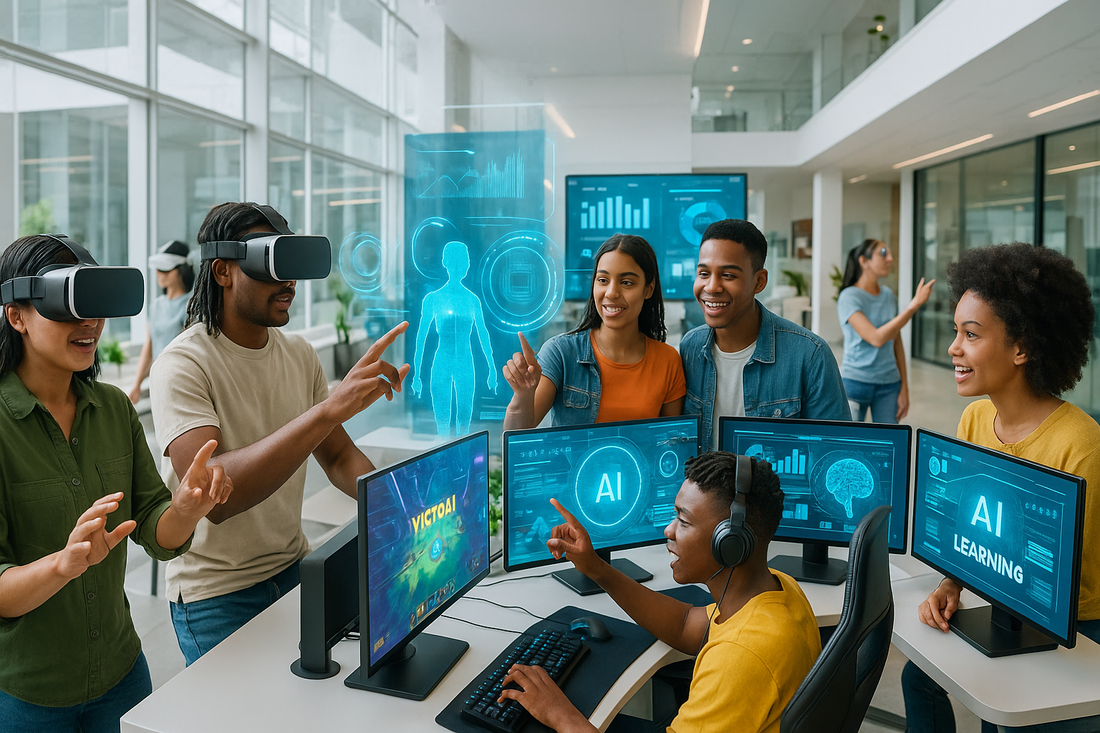
Leveling Up Digital Literacy: How Gamification, VR/AR, and E-sports Are Revolutionising AI Education in South Africa
Have you ever wondered how digital literacy can be transformed into an engaging and immersive experience, especially for South Africa’s youth and entrepreneurs?
With over 50.8 million internet users—a penetration rate of 78.9% as of early 2025—South Africa is rapidly advancing its digital landscape, yet nearly 21.1% of the population remains offline, underscoring the urgent need for inclusive and effective digital education. In this context, innovative approaches like gamification, Virtual Reality (VR), Augmented Reality (AR), and e-sports are emerging as powerful tools to make AI learning accessible, motivating, and contextually relevant.
Gamification: Making Learning Fun and Motivating
Gamification integrates game mechanics—such as points, leaderboards, challenges, and rewards—into educational content to tap into natural human motivators like competition and achievement. For South African learners, especially the youth and small business owners, this approach turns complex AI and digital literacy concepts into achievable and enjoyable goals.
Given South Africa’s diverse learning environments and mobile-first internet use, gamified platforms accessible via smartphones provide vital educational outreach, even in regions with limited traditional infrastructure. The instant feedback and adaptability offered by gamification suit varied learning styles, bridging gaps and encouraging persistence in mastering digital skills.
Immersive Learning through VR and AR
VR and AR technologies heighten engagement by placing learners inside interactive 3D environments that textbooks alone cannot provide. Virtual labs where students explore AI experiments or augmented reality simulations of digital markets offer hands-on experience that makes abstract concepts tangible.
These immersive environments support multilingual and multi-ability learning, advancing inclusion in a country with 11 official languages and diverse educational needs. The motivational power of exploring and experimenting in virtual spaces can counteract dropout rates and deepen practical understanding.
E-sports: A Dynamic New Frontier for AI Learning
E-sports, a booming sector and cultural phenomenon among South African youth, provides a natural extension to gamification and immersive learning. It creates competitive and collaborative environments where players develop real-time strategic thinking, decision making, and digital skills applicable to AI development.
A prime example is Game X Africa, a pioneering partner in this educational mission. Founded by Tyrone Damon, Game X Africa empowers underprivileged schools by providing gaming stations and meticulously designed programs that meld gameplay with skills development. Their Esports School Programme enhances problem-solving, leadership, and teamwork while raising awareness about digital careers in coding, game design, and beyond. Despite challenges like limited internet access, Game X Africa creatively ensures connectivity and continues to expand its reach through partnerships with organisations like Haibo Phanda.
Their work vividly demonstrates how e-sports can be a bridge to 21st-century skills, democratising access across socio-economic divides and making AI education culturally relevant and appealing.
Combined Benefits for Digital Literacy and AI Education:
Hands-on Practice: Learners engage actively by coding AI models, troubleshooting digital tools, or navigating digital ecosystems in safe, simulated settings.
Broad Accessibility: Multilingual and adaptable content promotes inclusion for learners with varied backgrounds and abilities.
Sustained Motivation: The mix of gamified challenges, immersive VR/AR contexts, and e-sports competition fosters continuous engagement and reduces dropout rates.
Real-World Applicability: Interactive scenarios help learners visualise AI’s practical uses, accelerating the transfer of skills to everyday challenges and business innovations.
South Africa’s Digital Future: Opportunities and Impact
South Africa’s digital economy is vibrant and growing—mobile connections reached 124 million in 2025, representing 193% of the total population, with broadband availability at 97.5%. Yet, gaps remain. Integrating gamification, VR/AR, and e-sports into formal and informal education can amplify digital inclusion efforts.
The synergy between these tools, illustrated by initiatives like Game X Africa’s Esports Programme, signals a shift toward engaging, culturally responsive AI literacy education. It equips young South Africans and entrepreneurs to thrive in the competitive digital landscape, transforming education from a static process into an interactive adventure.
